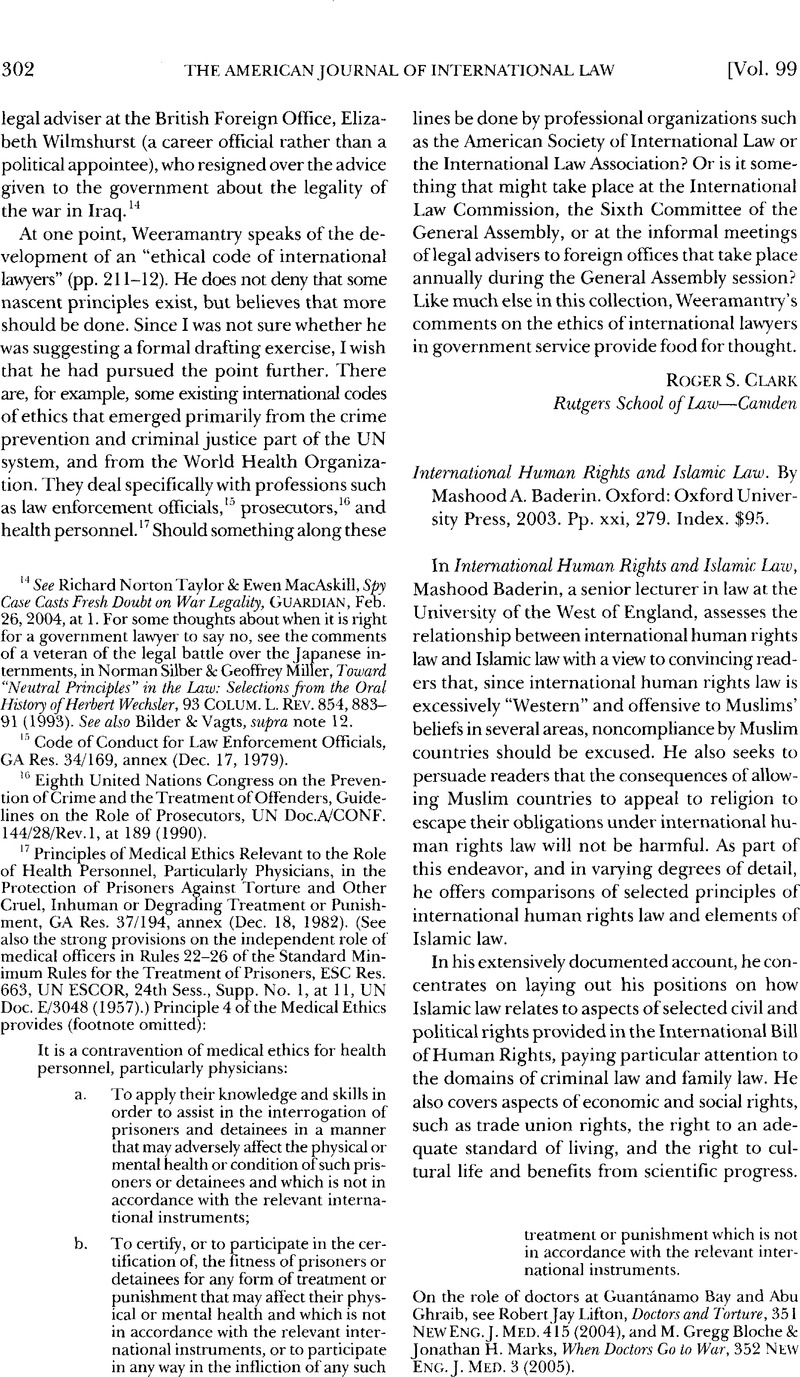No CrossRef data available.
Article contents
International Human Rights and Islamic Law. By Mashood A. Baderin. Oxford: Oxford University Press, 2003. Pp. xxi, 279. Index. $95.
Published online by Cambridge University Press: 27 February 2017
Abstract

- Type
- Recent Books on International Law
- Information
- Copyright
- Copyright © American Society of International Law 2005
References
1 Readers may find Baderin’s use of sources idiosyncratic and potentially unreliable. I discovered serious misrepresentations of my own publications, such as the startling claims that I have proposed that “Western culture should serve as the universal normative model for the content of international human rights law” (p. 10 n.3), and that I have argued that “Western norms should always be the universal normative model for international human rights law” (p. 26)—assertions totally alien to my philosophy. In reality, I have argued that the tendency to identify the UN human rights system with Western culture is misguided. See Ann Elizabeth, Mayer, Universal Versus Islamic Human Rights: A Clash of Cultures or a Clash with a Construct ? 15 Mich. J. Int’l L. 307 (1994)Google Scholar; see also Ann Elizabeth, Mayer, Current Muslim Thinking on Human Rights, in Human Rights in Africa: Cross-Cultural Perspectives 133,147- 48 (Abdullahi Ahmed, An-Na’ im & Francis, Deng eds., 1990)Google Scholar. Likewise, in an effort to buttress his thesis that support for universalism amounts to denigrating Islam and imposing Western values on Muslims, Baderin distorts a passage from my book Islam and Human Rights. Compare Ann Elizabeth, Mayer, Islam and Human Rights: Tradition and Politics 41 (3d ed. 1999)Google Scholar (discussing the parochialism of typical scholarship in international law, including the work of specialists who focus exclusively on the “Western legal heritage”), with Mashood, A Baderin, International Human Rights and Islamic Law 12 Google Scholar n.3 (mistakenly interpreting the above as an endorsement of a universalism defined by Western values).
2 478 U.S. 186 (1986). This decision was overruled by Lawrence v. Texas, 539 U.S. 558, in June 2003—presumably too late to be mentioned in Baderin’s book.
3 In Iran and Saudi Arabia, homosexuals are routinely executed. Even in less reactionary countries like Egypt, homosexuals are exposed to persecution, police brutality, and torture, in addition to harsh criminal penalties. See, e.g., Long, Scott, The Trials of Culture: Sex and Security in Egypt, Middle East Rep. Spring 2004, at 12 CrossRefGoogle Scholar; Human Rights Watch, In a Time of Torture: The Assault on Justice in Egypt’s Crackdown on. Homosexual Conduct (Mar. 1, 2004)Google Scholar, at <http://hrw.org/reports/2004/egypt0304/>.
4 In the UN record, the delegate’s comments were paraphrased as: “The Universal Declaration of Human Rights, which represented a secular understanding of the Judeo-Christian tradition, could not be implemented by Muslims and did not accord with the system of values recognized by the Islamic Republic of Iran; his country would therefore not hesitate to violate its provisions, since it had to choose between violating the divine law of the country and violating secular conventions,” UN GAOR 3d Comm., 39th Sess., 65th mtg. at 20, UN Doc. A/C.3/ 39/SR.65 (1984) (emphasis added). The significance of this comment is discussed in MAYER, supra note 1, at 8.
5 UN Doc. A/CONF.157/PC/62/Add.l8 (1993), available at <http://ww.umn.edu/urnam1s/instree/cairodeclaration. html> (English translation).




